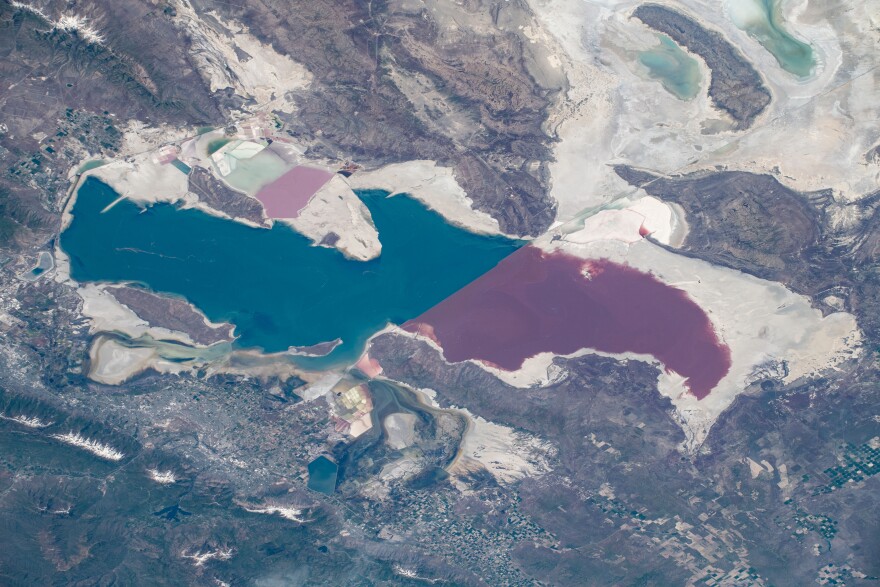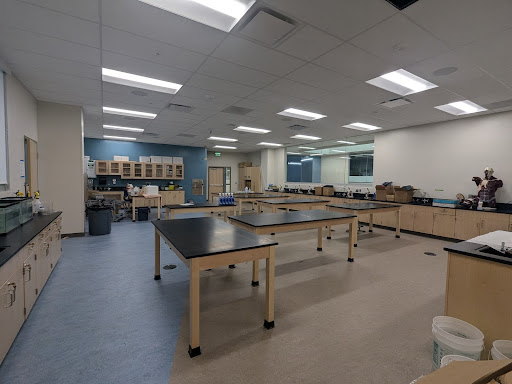Great Salt Lake is Shrinking, and Why You Should Care About It
As water is being diverted to other sources, The Great Salt Lake is shrinking, which is bad for Salt Lake City residents’ health. On its own, the Great Salt Lake would spread out 2,100 square miles, three times the size of Houston, Texas. Diverting water has reduced the lake by more than half, is concerning to scientists. As the lake shrinks it can create dust storms. The Great Salt Lake creates a coating on the lake bed that keeps the dust down, which will lead to dust storms that will create health problems for Salt Lake’s population. It also proved a problem for animal populations, and the symbolism that the lake stands for. The continuing shrinking is making many people push for lake conservation legislation.
Don Dalton, a science teacher at Skyline, gave a voice to the facts behind The Great Salt Lake shrinking. “What it’s really going to affect is us, the people here in Salt Lake, [because] once that lake dries up you get a lot of dust that’s going to fly around, and this has already happened in several places around the world.” Dalton did share some ways to reduce the amount of water being diverted by using piping agriculture dishes. Irrigation ditches are not piped, causing the water to evaporate, and companies need to take more water to make up for water lost. Dalton put forth another way to save water. “Charge people.” If people use more water than the average household user, they get charged an extra amount on their water bill.
Dalton also added, “It’s a real health hazard, you breathe in that dust and it causes cancers, respiratory problems, circulatory problems, it gets into the bloodstream and causes heart attacks and all that.” In redirecting the water for irrigation the government had caused harm to its people. Dalton once worked with a hydrologist who studied the water flows into the Great Salt Lake, where he learned a “dirty little secret” about the Great Salt Lake. Salt Lake Valley mining operations left behind residual heavy metals. “It’s not just regular dust. There’s mercury, there’s cadmium, there’s lead.” Salt Lake City is going to become a huge dust storm, laced with heavy metals. “If that happens the state of Utah is going to be sued over it. And people are going to leave. You don’t want to stay here and breathe in all that dust, even if it doesn’t have heavy metals in it you don’t want to breathe it in,” Dalton stated.
A student at Skyline, Mike, talked about people’s morale if the lake vanished: “It’s a major fixture of the state, as a body of water, and as a symbol. It’s not Salt Lake City without The Great Salt Lake.” He went on to say, “If it wasn’t there we wouldn’t have the occasional strong sulfur smell that you get out in the valley when the wind picks up, and blows that forward.”
This lack of water also poses a problem to the animals and insects that depend on the lake. Without the lake, 338 species of birds that come through Salt Lake won’t have food. Another freshman from Skyline, Valerie, shared her concerns. “Those birds help keep other ecosystems alive.” Valerie added, “The food chain could really affect that, and the life of other animals around.
On Tuesday, February 15 fifty Utah legislators flew over The Great Salt Lake in Army National Guard in helicopters as part of aerial tours to support Guard training. They were startled by what they saw. The drought caused many people to push for water saving and lake conservation plans. But will it be enough? The Great Salt Lake has been shrinking since 1847, and reached a record low in 2016.







